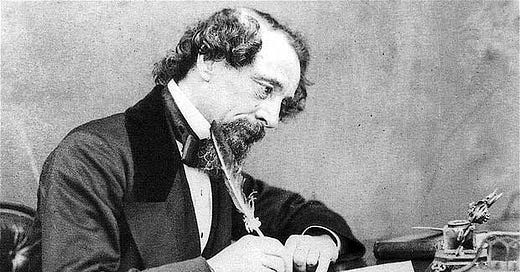The Best Advice You'll Ever Hear on How to Write
These are not just words. These are tools to make magic happen. They transform the ethereal into the concrete.
The only way I was able to learn how to write was to mimic. Monkey see, monkey do.
This list is adapted from (probably) the best article I ever read on how to write: 10 Tips for Writing the Living Web by Mark Bernstein.
Rule 1: Pick a niche; Offer the reader something valuable
I was 36 before I became a financial journalist.
Devoting myself to a niche, and drilling down hard into one super-specific area means I can explain and illuminate thorny ideas. I have an audience who come to me because they can’t get what I provide anywhere else.
“All mammals have a strong exploratory urge. If they have put all their evolutionary effort into the perfection of one particular survival trick, they do not need to bother much about the general complexities of the world around them.”
— Desmond Morris, The Naked Ape, 1967
Rule 2: Cut unnecessary words.
“I have made this letter longer, only because I have not had the time to make it shorter.”
— Blaise Pascal, Lettres Provinciales, 1657**
I once interviewed a very intense actor by the name of Joe O’Byrne.
He was hypnotic, in the kind of way a far-off loudly barking dog is. As I got closer, the hairs lifted on the back of my neck, and I wondered whether a sudden move or a badly-timed joke would leave me wasting my Friday night groaning in A&E.
Joe was putting together a series of plays for his first run at Salford Arts Theatre.
He told me editing his text down to fit the 90-minute run limit was “like cutting my arms and legs off.”
It isn’t hyperbole.
Writing is deeply personal. It means something. To have to cut is to feel you are obliterating nuance. It’s painful. But it works.
Rule 3: Have a reason to write
“Blessed is he who has found his work…He has a life purpose, and will follow it.”
— Thomas Carlyle, Past and Present, 1843
People are fascinated by detail. If you can infuse detail with passion, you imbue that passion in others and let it flourish.
“We never stop investigating. We are never satisfied that we know enough to get by. Every question we answer leads on to another question. This has become the greatest survival trick of our species.”
— Desmond Morris, The Naked Ape, 1967
Bad writing has no flow. It is unconsidered and unedited. It is littered with personal anecdotes which do not advance the story.
As Mark Bernstein says: don’t tell people what happened — tell them why it mattered.
Rule 4: Be consistent
Missing one deadline — while it will piss off your editor — is not the end of the world. It’s unfortunate. Missing two? That looks like carelessness. And how are you going to get anyone to care, if you do not?
Rule 5: Be honest
This is the hardest part about being a writer. To be honest with the world can be embarrassing. It allows the slings and arrows of outrageous fortune to whack you about the face.
But we write to connect. We write to find support. We write because we can’t do anything else particularly well.
And readers respond to honesty. They can get bland diatribes in every other corner of the internet.
Eventually, if you keep at it long enough, and the burning urge persists, you develop your own style.
“Talent does what it can. Genius what it must.”
— Andrew Carnegie, A Biography of James Watt, 1952
While I’m no genius, if I don’t write, I can’t express myself.
Write to express something. Anything. Just don’t be boring.
End Creditors
** The originator of this quote is disputed: some of its earliest variants go back as far as Cicero, but if anyone has a definitive answer please let me know.




